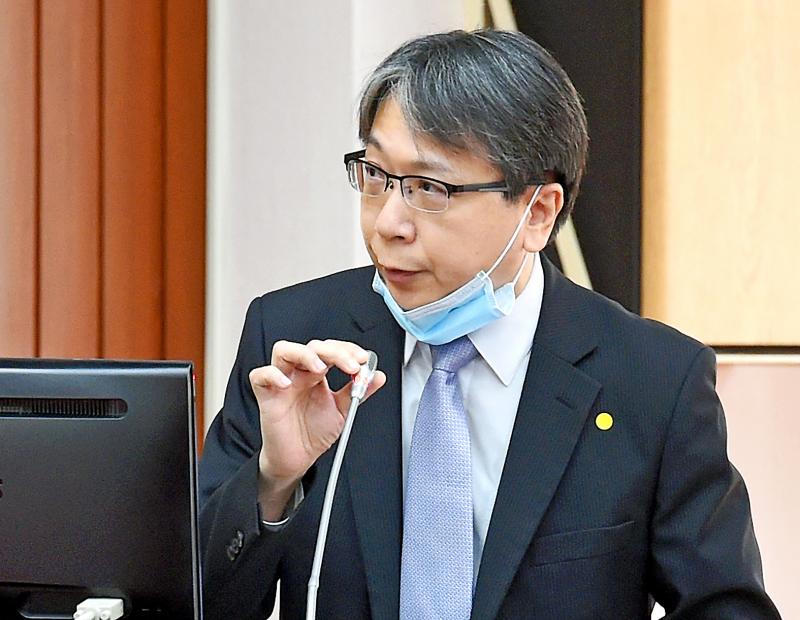The Chinese government’s proposed national security law for Hong Kong could jeopardize the right to personal freedom of Taiwanese in the region, National Security Council (NSC) Deputy Secretary-General Tsai Ming-yen (蔡明彥) said yesterday.
China’s National People’s Congress on Friday last week unveiled a proposal to enact a Hong Kong security law.
The proposed “enforcement mechanisms,” which are expected to ban treason, subversion and sedition, are being introduced in response to last year’s pro-democracy protests in the territory.

Photo: Chu Pei-hsiung, Taipei Times
If Beijing passes the controversial law, it would have broken its promise to respect the territory’s autonomy under its “one country, two systems” model, Tsai said in response to a question from Democratic Progressive Party (DPP) Legislator Wu Yu-chin (吳玉琴) at a meeting of the legislature’s Finance Committee in Taipei.
The council is concerned that the law could affect the personal freedom of Taiwanese, such as businesspeople or workers at non-governmental organizations, when they engage in interviews or other exchanges in the region, Tsai said.
The legislation would overturn the special status — both legally and politically — that China has assigned to Hong Kong as a Special Administrative Region, he said.
Asked by Chinese Nationalist Party (KMT) Legislator Lai Shyh-bao (賴士葆) whether the proposed law would impact Hong Kong’s financial markets and lead to capital flowing to Taiwan, Tsai said that it could have that effect.
As investors are based in the territory due to its special status, passage of the proposed legislation could result in the flight of foreign capital, as well as talent, Tsai said, adding that the council would pay close attention to developments.
The council would also need to review whether capital investments from Hong Kong would need to be redefined as Chinese capital, Tsai said in response to a query from DPP Legislator Kao Chia-yu (高嘉瑜).
Wu urged the government to respond with caution to the proposed law — which would give the Hong Kong government the power to detain or incarcerate individuals on subversion or “other unwarranted charges” — to safeguard the rights of Taiwanese in the territory.
Beijing has never given up on annexing Taiwan, she said, adding that it has waged several “wars” against the nation, including “public opinion and legal warfare.”
Taiwan every month is subject to about 30 million cyberattacks likely orchestrated by the Chinese Communist Party, and although the interception rate is as high as 99.99 percent, the 0.01 percent not intercepted could be a loophole, she said, citing Executive Yuan data.
From the increasing and intensified number of cyberattacks on Taiwan, it is clear that Beijing has created a “nationwide cyberarmy,” Tsai said.
The council would stay abreast of cybersecurity developments in Taiwan and other nations to ensure the best defensive policies are implemented when required, he said.
Additional reporting by CNA

CHAOS: Iranians took to the streets playing celebratory music after reports of Khamenei’s death on Saturday, while mourners also gathered in Tehran yesterday Iranian Supreme Leader Ayatollah Ali Khamenei was killed in a major attack on Iran launched by Israel and the US, throwing the future of the Islamic republic into doubt and raising the risk of regional instability. Iranian state television and the state-run IRNA news agency announced the 86-year-old’s death early yesterday. US President Donald Trump said it gave Iranians their “greatest chance” to “take back” their country. The announcements came after a joint US and Israeli aerial bombardment that targeted Iranian military and governmental sites. Trump said the “heavy and pinpoint bombing” would continue through the week or as long

TRUST: The KMT said it respected the US’ timing and considerations, and hoped it would continue to honor its commitments to helping Taiwan bolster its defenses and deterrence US President Donald Trump is delaying a multibillion-dollar arms sale to Taiwan to ensure his visit to Beijing is successful, a New York Times report said. The weapons sales package has stalled in the US Department of State, the report said, citing US officials it did not identify. The White House has told agencies not to push forward ahead of Trump’s meeting with Chinese President Xi Jinping (習近平), it said. The two last month held a phone call to discuss trade and geopolitical flashpoints ahead of the summit. Xi raised the Taiwan issue and urged the US to handle arms sales to

State-run CPC Corp, Taiwan (CPC, 台灣中油) yesterday said that it had confirmed on Saturday night with its liquefied natural gas (LNG) and crude oil suppliers that shipments are proceeding as scheduled and that domestic supplies remain unaffected. The CPC yesterday announced the gasoline and diesel prices will rise by NT$0.2 and NT$0.4 per liter, respectively, starting Monday, citing Middle East tensions and blizzards in the eastern United States. CPC also iterated it has been reducing the proportion of crude oil imports from the Middle East and diversifying its supply sources in the past few years in response to geopolitical risks, expanding

Pro-democracy media tycoon Jimmy Lai’s (黎智英) fraud conviction and prison sentence were yesterday overturned by a Hong Kong court, in a surprise legal decision that comes soon after Lai was jailed for 20 years on a separate national security charge. Judges Jeremy Poon (潘兆初), Anthea Pang (彭寶琴) and Derek Pang (彭偉昌) said in the judgement that they allowed the appeal from Lai, and another defendant in the case, to proceed, as a lower court judge had “erred.” “The Court of Appeal gave them leave to appeal against their conviction, allowed their appeals, quashed the convictions and set aside the sentences,” the judges